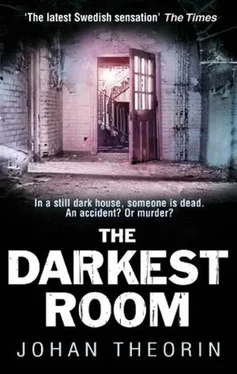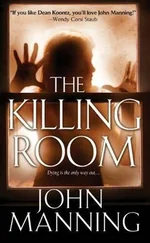Westin looked at Gerlof and nodded silently. “Come in.”
The children were at preschool, and the atmosphere in the bright rooms was silent and solemn. Tilda could see that Westin had worked hard over the past few weeks. Almost the whole of the ground floor had been painted and wallpapered, and it was beginning to look like a real home.
“It almost feels like a journey back in time,” she said as they walked into the big drawing room. “Like walking into a nineteenth-century manor house.”
“Thank you,” said Joakim.
He took it as a compliment, despite the fact that Tilda was mainly envious of the size of the room. She still wouldn’t want to live out here.
“Where did you find all the furniture?” asked Gerlof.
“We searched and searched… both here on the island and in Stockholm,” said Joakim. “Large rooms need large pieces of furniture to occupy the space. We’ve often looked for old pieces that we could renovate.”
“That’s a good approach,” said Gerlof. “These days people rarely set any store by their possessions. They don’t repair things that are broken, they simply throw them away. It’s buying things that’s important, not looking after them.”
Tilda realized that he enjoyed going around old houses. For Gerlof the pleasure in seeing beautiful, well-made possessions went hand in hand with the knowledge of the hard work that lay behind them. Tilda had seen him sitting and contemplating items he owned-an old seaman’s chest or a collection of linen hand towels-as if he could feel all the memories they brought with them.
“I imagine you get kind of addicted to this?” asked Gerlof.
“Addicted to what?” said Joakim.
“Fixing up houses.”
He was smiling, but Joakim shook his head.
“It’s not an addiction. It’s not as if we want a new kitchen every year, like some families in Stockholm… and this is only the second house we’ve taken on. Before that we only fixed up apartments.”
“So where was the first house?”
“Outside Stockholm, in Bromma. A beautiful detached house that we renovated from top to bottom.”
“And why did you move? What was wrong with the house?”
Joakim avoided meeting Gerlof’s eye. “There was nothing wrong… we really liked the house. But it’s good to move up to something bigger now and again. Financially, above all.”
“Oh?”
“You take out a loan and find a run-down apartment in a good location and start renovating it in the evenings and on the weekends, while living there at the same time. Then you
find the right buyer and sell it for much more than you paid… then you take out a new loan and buy another rundown apartment in an even better location.”
“And you sell that one too?”
Joakim nodded. “Of course it wouldn’t be possible to make money out of property if the demand for places to live wasn’t so high. I mean, everybody wants to live in Stockholm.”
“Not me,” said Gerlof.
“But lots of people do… prices are going up all the time.”
“So both you and your wife were good at fixing places up?” said Tilda.
“We actually met when we both went to an open house at an apartment,” said Joakim with fresh energy in his voice. “An old lady had been living in a big apartment with a whole lot of cats. The location was perfect, but Katrine and I were the only ones who could put up with the stench, and stayed behind. We went for coffee afterward and talked about what could be done with the place…It became our first project together.”
Gerlof turned and looked around the drawing room, his expression grim. “And of course you’re intending to do the same thing with Eel Point,” he said. “Move in, renovate it, sell it.”
Joakim shook his head. “We’d intended to stay here for many years. We wanted to rent out rooms, maybe even open a small restaurant.” He looked out of the window and added, “We didn’t really have a set plan for everything we wanted to do, but we knew we were going to be happy here…”
His energy had disappeared again, Tilda could see. The silence in the white room was oppressive.
After a tour of the house they sat down in the kitchen with a cup of coffee.
“Tilda said you wanted to hear some stories about the manor,” said Gerlof.
“I’d like that,” said Joakim, “if there are any.”
“Oh, there are,” said Gerlof. “But I suppose you mean ghost stories? Is that the kind of thing you’re interested in?”
Joakim hesitated, as if he was afraid someone might be eavesdropping, then said, “I’d just like to know if anyone else has experienced unusual things here,” he said. “I’ve felt… or imagined I’ve felt… the presence of the dead at Eel Point. Both out by the lighthouses and here inside the manor. Others who have been here seem to have had a similar experience.”
Tilda said nothing, but she was thinking of the October evening when she had waited here for Westin. She had been alone here then-but it hadn’t really felt that way.
“Those who have lived here in times gone by are still here,” said Gerlof, his coffee cup in his hand. “Do you think they rest only in graveyards?”
“But that’s where they’re buried,” said Joakim quietly.
“Not always.” Gerlof nodded toward the expanse of plowed fields at the back of the house. “The dead are our neighbors everywhere here on the island, and you just have to get used to it. The whole countryside is full of old graves… tumuli containing chambers from the Stone Age, burial cairns and cists from the Bronze Age, and the burial grounds of the Vikings.”
Gerlof turned to look out toward the sea, where the horizon had disappeared in a damp winter fog.
“And there’s a churchyard out there too,” he said. “The whole of the east coast is a graveyard for hundreds of ships that ran up on the sandbanks and were smashed to pieces, and for all the sailors who drowned. Many of those who went to sea in days gone by couldn’t even swim.”
Joakim nodded and closed his eyes. “I didn’t believe in anything,” he said. “Before we came here I didn’t believe the dead could come back… but now I don’t know what to believe. A number of remarkable things have happened here.”
Silence fell in the kitchen.
“Whatever you might feel of the dead, or whatever you think you might see,” said Gerlof slowly, “it can be dangerous to let them rule our actions.”
“Yes,” said Joakim quietly.
“And to try to call them up… or ask questions.”
“Questions?”
“You never know what answers you might get,” said Gerlof.
Joakim looked down into his coffee cup and nodded. “But I have wondered about this story that says they will return here.”
“Who?”
“The dead. When I was having coffee with the neighbors, they told me a story: those who have died here at the manor return home every Christmas. I was just wondering if there were any more tales about that?”
“Oh, that’s an old story,” said Gerlof. “It’s told in many places, not just here at Eel Point. The Christmas vigil of the dead, that’s when those who have passed away during the year return for their own Christmas service. Anyone who disturbed them at that time had to run for their life.”
Joakim nodded. “An encounter with the dead.”
“Exactly. There was a strong belief that people would be able to see the dead again… and not only in church. In their homes too.”
“At home?”
“According to folk beliefs, you should place a candle in the window at Christmas,” said Gerlof, “so that the dead can find their way home.”
Joakim leaned forward. “But was that just those who had passed away in the house,” he said, “or other dead people as well?”
Читать дальше










